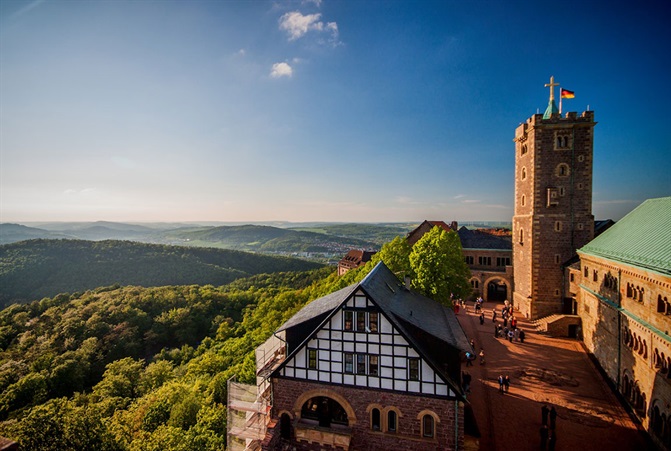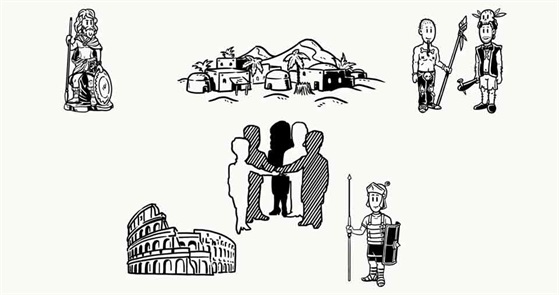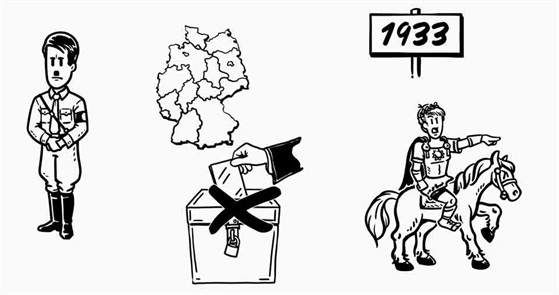🏰
Life in Germany > History

©
copyright_jo,sau_Lizenz_CC_BY_2,0
What should I know about German history?
What influence has their history on the Germans?
The first people who populated Germany are called Germanic and Celtic. They lived together in tribes and formed out a variety of nations. Even Roman settlers were part of the first people in Germany. The history of the country begins in the 10th century AD, with the Roman-German Empire. This time is also known as the middle Ages and lasted until 1500 AD. In the middle Ages various kings and emperors ruled in Germany on individual parts of the country. This was the first form of the German tradition of federalism, which is characterized by many independent parts of the country. Today the country is still divided into many mostly independent federal states.
The Middle Ages were characterized by ecclesiastical world view, many warlike confrontation and missing. Progress in technology, science and medicine.In the 16th century, Martin Luther initiated the Reformation, which is still a milestone in German history today. Until then, kings and emperors based their rule on the Christian religion, as they interpreted it. By denouncing his so-called theses, Luther condemned the actions of the church at that time. With the translation of the Bible from Latin, he made sure that anyone could understand the contents of the Bible and thus invalidated the full influence of the Church.
After the end of the middle Ages as well as numerous upheavals the many small states and principalities were annexed to larger states. In 1871 Wilhelm the first was proclaimed emperor and with that the ruler of the German Empire. The prevailing form of government at that time was the monarchy. In 1900 the industrialization took place in Germany. The previously predominantly agricultural structures where now replaced by the technical progress. They were in need of new workers and more space to spread further and be able to demonstrate the power of the German Empire. Because other countries in the world pursued this endeavor as well, the 1st World War took place from 1914 to 1918. The German Empire lost the war and was restructured again. After the November Revolution, the population opted for an end of the monarchy and the Weimar Republic was proclaimed.
This time period lead to the first democratic form of government in Germany. The twenties was a rather quiet period that came to an abrupt end by the global economic crisis. During this time, money lost its value and many people were unemployed. The national socialists used this conditions to their advantages and promise that the state would improve under their leadership. 1933 Adolf Hitler and his national socialistic regime came into power. Hitler ended the democracy and led it into a dictatorship, in which he wanted to be considered as the total ruler. This was followed by a bad time of oppression and persecution for many people, especially Jews, who were considered enemies. This period culminated in World War II, which took place from 1939 to 1945, as Hitler's aim was to dominate the whole world. Many countries of the world were involved in the war and stopped Hitler and his system. Germany lost the war.
As a result, Germany was divided by the victors into four occupation zones. The Soviet Union (now Russia) dominated the eastern region, while the United States, Britain and France shared the west. Berlin as the capital has also been divided into four zones. In the Soviet zone, the country should be rebuilt after communist model, which brought many disadvantages for the people. There was a so-called dictatorship of the proletariat. There was only one party that could be elected, and the people were monitored and controlled. The victors in the Western occupation zones meanwhile worked on economic reconstruction and founded in 1949 the independent Federal Republic of Germany (FRG). The form of government was a democracy, where the social market economy allowed people to be able to buy many things. In the eastern zone, the German Democratic Republic (GDR) was created after the apparent principle of communism. There was a planned economy, which means that the government determines who what and how much should consume. Due to the injustices in the GDR, many people fled to the western part of Germany. To prevent this a border was drawn between both parts of Germany and later a wall was built to keep people from crossing to the other side. The remains of the wall can still be visited today in Berlin.
After the peaceful revolution, where many people of the GDR protested against their regime it ended in 1989. The wall that divided Germany, was demolished and Germany reunited. After initially difficult years in which Germany has suffered economically it fully recovered. Germany has now established a reputation as a state with strong economic power but also with social responsibility and today offers many people the opportunity to a free and independent life. Germany is also a distinguished member of the European Union.
Phrases
I like to do a city trip.
Ich möchte gern eine Stadtführung machen.
What sightseeing highlights do you recommend?
Welche Sehenswürdigkeiten empfehlen Sie.
How can I find..
Wie finde ich zum …
I am searching…
Ich suche …
What sightseeing points does this region offer?
Was für Sehenswürdigkeiten bietet diese Stadt/dieser Landkreis/diese Region?
I am searching a park.
Ich suche einen Park.
I want to go to the city center.
Ich möchte in die Innenstadt.


